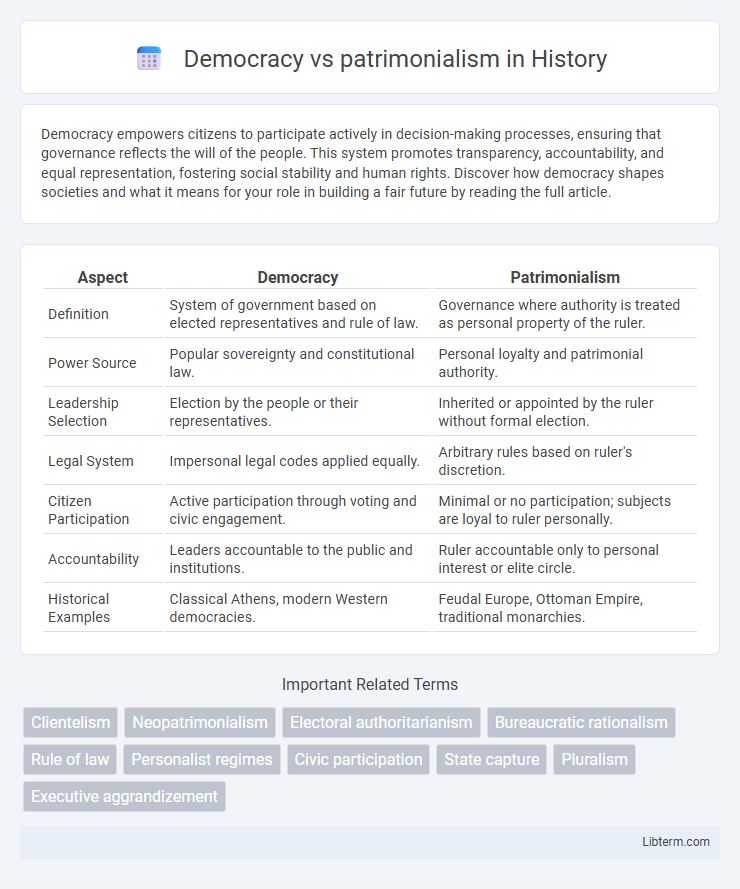Democracy empowers citizens to participate actively in decision-making processes, ensuring that governance reflects the will of the people. This system promotes transparency, accountability, and equal representation, fostering social stability and human rights. Discover how democracy shapes societies and what it means for your role in building a fair future by reading the full article.
Table of Comparison
| Aspect | Democracy | Patrimonialism |
|---|---|---|
| Definition | System of government based on elected representatives and rule of law. | Governance where authority is treated as personal property of the ruler. |
| Power Source | Popular sovereignty and constitutional law. | Personal loyalty and patrimonial authority. |
| Leadership Selection | Election by the people or their representatives. | Inherited or appointed by the ruler without formal election. |
| Legal System | Impersonal legal codes applied equally. | Arbitrary rules based on ruler's discretion. |
| Citizen Participation | Active participation through voting and civic engagement. | Minimal or no participation; subjects are loyal to ruler personally. |
| Accountability | Leaders accountable to the public and institutions. | Ruler accountable only to personal interest or elite circle. |
| Historical Examples | Classical Athens, modern Western democracies. | Feudal Europe, Ottoman Empire, traditional monarchies. |
Defining Democracy and Patrimonialism
Democracy is a system of government characterized by free and fair elections, political pluralism, and the protection of individual rights, ensuring that power derives from the consent of the governed. Patrimonialism refers to a form of governance where authority is concentrated in the hands of a single ruler or ruling family, who treat state resources and institutions as personal property. While democracy emphasizes institutional checks and popular participation, patrimonialism relies on personal loyalty and hierarchical control without legal-rational legitimacy.
Historical Origins and Evolution
Democracy originated in ancient Athens around the 5th century BCE, characterized by citizen participation and collective decision-making, evolving through Enlightenment principles emphasizing individual rights and representative governance. Patrimonialism traces back to pre-modern societies where rulers treated the state as personal property, often linked to feudal systems and monarchies with power inherited through lineage. Over time, democracy expanded globally through revolutions and reforms, while patrimonialism declined but persists in certain authoritarian regimes where governance blends public authority with private interests.
Key Features of Democratic Systems
Democratic systems prioritize free and fair elections, ensuring that citizens have equal voting rights and the ability to choose their leaders through transparent processes. Institutions operate based on the rule of law, with checks and balances that prevent the concentration of power and protect individual freedoms. Accountability, political pluralism, and the protection of civil liberties are essential components that distinguish democratic governance from patrimonial rule.
Characteristics of Patrimonial Rule
Patrimonial rule is characterized by the concentration of power in the hands of a single ruler or a ruling family, where authority is based on personal loyalty rather than legal-rational legitimacy. Governance under patrimonialism often lacks institutional checks and balances, leading to arbitrary decision-making and the blending of public and private interests. The bureaucracy serves the ruler's personal interests, and political power is maintained through patronage networks and kinship ties rather than democratic processes.
Political Institutions: Elections vs. Patronage
Democracy relies on free, competitive elections that enable citizens to choose leaders and hold them accountable through institutionalized voting systems. Patrimonialism centers on patronage networks where political power is distributed based on personal loyalty and favors rather than formal electoral processes. Political institutions under democracy promote transparency and rule of law, whereas patrimonial systems foster informal governance marked by clientelism and personalized authority.
Power Structures and Leadership Styles
Democracy features power structures based on elected representatives and institutional checks that promote accountability and participation, whereas patrimonialism centers power in a single ruler or elite family, blending public authority with personal ownership. Leadership in democracies typically emphasizes transparency, rule of law, and responsiveness to citizens, while patrimonial leadership often relies on loyalty, patronage networks, and centralized decision-making. These contrasting frameworks impact governance effectiveness, citizen engagement, and the distribution of power within societies.
Impact on Governance and Accountability
Democracy promotes transparent governance through elections, public participation, and institutional checks that enhance accountability and reduce corruption. Patrimonialism centralizes power within a single authority or ruling family, often resulting in opaque decision-making and weakened mechanisms for holding leaders accountable. This concentration of power leads to governance characterized by favoritism and limited public oversight, undermining institutional integrity.
Social and Economic Consequences
Democracy fosters social equality by promoting inclusive participation and protecting individual rights, which often leads to greater social mobility and widespread economic development. Patrimonialism concentrates power and resources within a ruling elite, resulting in social stratification and economic disparities that hinder broad-based growth. Societies under patrimonial regimes typically experience limited access to education and markets, exacerbating poverty and reducing overall economic productivity.
Case Studies: Countries in Contrast
Democracy in countries like Sweden showcases strong institutions, transparent governance, and citizen participation, leading to high levels of political stability and social trust. In contrast, patrimonialism observed in nations such as Saudi Arabia features centralized power concentrated within ruling elites, limited political pluralism, and governance rooted in personal loyalty rather than legal-rational authority. Case studies highlight how democratic systems promote accountability and development, while patrimonial states often struggle with corruption and limited civic freedoms.
Challenges and Prospects for Reform
Democracy faces challenges in patrimonial societies where personal loyalty and centralized control undermine institutional accountability and rule of law, leading to limited political pluralism and corruption. Reform prospects hinge on strengthening legal frameworks, promoting civic education, and fostering inclusive political participation to transition from patrimonial governance to democratic institutions. Successful reforms require sustained external support and local commitment to transparency and decentralization to build resilient democratic structures.
Democracy Infographic

 libterm.com
libterm.com